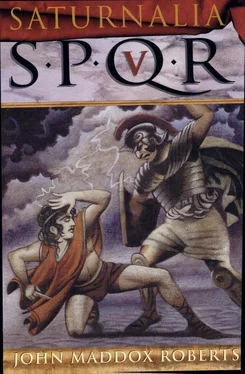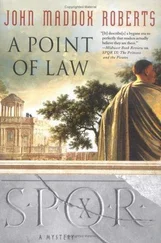John Roberts - Saturnalia
Здесь есть возможность читать онлайн «John Roberts - Saturnalia» весь текст электронной книги совершенно бесплатно (целиком полную версию без сокращений). В некоторых случаях можно слушать аудио, скачать через торрент в формате fb2 и присутствует краткое содержание. Год выпуска: 0101, ISBN: 0101, Издательство: St. Martin, Жанр: Исторический детектив, на английском языке. Описание произведения, (предисловие) а так же отзывы посетителей доступны на портале библиотеки ЛибКат.
- Название:Saturnalia
- Автор:
- Издательство:St. Martin
- Жанр:
- Год:0101
- ISBN:9780312320188
- Рейтинг книги:4 / 5. Голосов: 1
-
Избранное:Добавить в избранное
- Отзывы:
-
Ваша оценка:
- 80
- 1
- 2
- 3
- 4
- 5
Saturnalia: краткое содержание, описание и аннотация
Предлагаем к чтению аннотацию, описание, краткое содержание или предисловие (зависит от того, что написал сам автор книги «Saturnalia»). Если вы не нашли необходимую информацию о книге — напишите в комментариях, мы постараемся отыскать её.
Saturnalia — читать онлайн бесплатно полную книгу (весь текст) целиком
Ниже представлен текст книги, разбитый по страницам. Система сохранения места последней прочитанной страницы, позволяет с удобством читать онлайн бесплатно книгу «Saturnalia», без необходимости каждый раз заново искать на чём Вы остановились. Поставьте закладку, и сможете в любой момент перейти на страницу, на которой закончили чтение.
Интервал:
Закладка:

John Maddox Roberts
Saturnalia
SPQR
Senatus Populus Que Romanus
The Senate and People of Rome
1
I set foot in Italy once more on a filthy day in December. The wind blew cold rain in my face as the little naval cutter pulled up under oars to the dock at Tarentum. It was an evil time of year to be at sea, months past the good sailing season. Of course, as far as I am concerned, there is no such thing as a good sailing season. We had left Rhodes in similarly foul weather and hopped among the tedious string of islands, then up the ragged coast of Greece. From there we hopped across the strait that separates Greece from Italy, then around the southern cape and into the relatively sheltered waters of the Tarentine Gulf.
I went up the gangplank and stepped ashore with my usual sense of profound relief. I didn’t quite get down on my knees and kiss the ground, but only from a sense of decorum. Immediately, my stomach began to settle. But it was still raining.
“Land!” Hermes cried with intense, heartfelt relief. He was carrying the bundles of our belongings beneath both arms. He hated the sea even more than I did.
“Enjoy it while you can,” I advised him. “You’re about to exchange a heaving stomach for sores on your backside.”
“You mean we have to ride?” He disliked horses almost as much as he hated the sea.
“Did you think we were going to walk to Rome?”
“I think I could stand it. How far is it?”
“Almost three hundred miles. Luckily, all of it is over first-class roads. We’ll take the Via Appia at least as far as Capua, then we’ll either continue on the Appia to Rome or take the Via Latina, depending on the conditions. About the same distance either way. The Latina may be a little drier this time of year.”
“That far?” Hermes asked. As my slave he had traveled a good deal farther than most boys his age, but he was still a little hazy about geography. “But we’re in Italy!”
“There’s more of Italy than you would think. Now go get the rest of our luggage.”
He went back to the ship grumbling to fetch my chest and a few other belongings. As he did this, an official-looking man came down the pier, accompanied by a secretary.
“Quintus Silanus,” he said, “Master of the Port. And you would be …?”
“Decius Caecilius Metellus the Younger,” I told him.
“The Censor’s son, eh? We were told you might be landing here or at Brundisium. Welcome back to Italy, Senator. We’ve made provision to get you back to Rome as quickly as possible.”
I was impressed. I had never before been considered that important. “Really? What sort of provision?”
“Let’s get in out of this rain,” Silanus said. I followed him to an office just past the naval dock, where we ducked beneath the portico and shook the rain from our clothes. Then we went inside his office, a cramped cubicle, its walls honeycombed with cubbyholes for documents.
“Here, have something to settle your stomach,” Silanus said. A slave poured me a cup of pale wine. It was a decent Bruttian, not excessively watered.
“I have horses waiting for you at the municipal stable near the Appian Gate, and somewhere here I have requisition chits for you, so you can get stabling and fodder for them between here and Rome. Fresh horses, too, if you need them.” He rummaged around in the cubbyholes for a minute until the secretary smoothly brushed him aside and reached into one of them and came out with a leather sack full of little scrolls.
“Who arranged for all this?” I asked.
“The Censor,” Silanus said. “Weren’t you expecting it?”
“Well, no,” I admitted. “I got his summons on Rhodes and jumped on the first ship headed for Italy, but I thought I’d have to make my own way to Rome. Ordinarily, when I come home my father doesn’t come running out the gate to greet me, arms open and toga flapping, if you know what I mean.”
“Well, fathers are like that,” Silanus said, pouring himself a cup. “You can’t really expect them to behave like your old Sabine nurse.”
“I suppose not. What’s the countryside like these days?”
“Uncommonly quiet. You can leave your arms in your baggage for a change.”
“What about the city?” I asked.
“That I couldn’t say. I hear it’s been rough lately.”
“Clodius?” This was the year Clodius was standing for tribune. In most ways it was the most powerful office in Rome at the time: and if Clodius was elected, he would for a year be both immensely powerful and sacrosanct, untouchable by the law or his fellow citizens. The very thought gave me stomach twinges. It was generally agreed that he would win his election easily. The Claudians were patricians, barred from the office, and Clodius had campaigned hard to get transferred to the plebs. Finally, with the influence of Caesar and Pompey, he had achieved his wish through adoption by an obscure plebeian relative named Fonteius. Everyone who had fought against his transfer had much unpleasantness to look forward to in the coming year.
“He’s Caesar’s dog,” Silanus said, “but word has it that the Consul doesn’t keep him on a tight leash.” Silanus, like everyone else, spoke of Caesar as if he were the only consul. His colleague in office, Bibulus, was such a nonentity that Romans ever since have referred to that year as “the consulship of Julius and Caesar.” I took my chits and gathered up my slave and my belongings, and I trudged through the rain to the Appian Hate.
By general agreement, I wasn’t supposed to return to Rome until Clodius was safely out of office and, by preference, out of Rome. But then, Metellus Celer wasn’t supposed to die, either. My father’s summons had been peremptory, to say the least.
Our kinsman, Quintus Caecilius Metellus Celer is dead: it is believed by poison. The family is convening for his obsequies. You are to return to Rome immediately.
It seemed a bit extreme. Granted, Celer was the most distinguished Caecilian of the time, but ordinarily only his immediate family and any members of the gens who happened to be in Rome at the time of his death would attend his funeral and see to the other observances surrounding the passing of a prominent man. To call in Caecilians from as far away as Rhodes suggested that a political crisis was in the offing.
We Metelli were political creatures down to our bones, but I was the one member of the whole family whose presence in Rome was considered to be a political liability. My knack for making enemies was remarkable in a man devoid of political ambition. People with things to hide were nervous around me.
At the city gate Hermes and I picked up our horses and packed our skimpy belongings on a third beast. As we trotted away Hermes bounced on his saddle in a way that was painful to watch. Naturally, I laughed heartily at this. I rode passably well. When I was very small I rode gentle mares on our rural estates; and when I assumed my manhood toga, my father sent me to the circus to be trained by the riders who gallop alongside the chariots, urging on the four-horse teams. This practice served me well in Spain, for much of the guerilla chasing we engaged in among the hills was done by cavalry. Still, horses were never a passion with me, and I always preferred to see professionals doing the riding and driving from the ease of the stands. Still, it beat walking or sailing. Anything beat sailing.
Like all our roads, the Appia was beautifully kept. It was the oldest of our major highways, the stretch between Capua and Rome having been begun by Appius Claudius Caecus nearly three hundred years before, and the rest of it almost as elderly, so that the poplars and cedars planted along its length were stately and mature. The tombs built by the side of the road were for the most part of a pleasingly simple design reflecting the taste of a bygone era. Every thousand paces stood a milestone, inscribed with the distances to the nearest towns and, as always, the precise distance to the Golden Milestone in the Forum Romanum. That way, anywhere in our empire, a Roman citizen knows exactly how far it is to the center of Roman communal life. We find this comforting for some obscure reason. Perhaps it is because, when wandering among barbarians, we find it difficult to believe that Rome exists at all.
Читать дальшеИнтервал:
Закладка:
Похожие книги на «Saturnalia»
Представляем Вашему вниманию похожие книги на «Saturnalia» списком для выбора. Мы отобрали схожую по названию и смыслу литературу в надежде предоставить читателям больше вариантов отыскать новые, интересные, ещё непрочитанные произведения.
Обсуждение, отзывы о книге «Saturnalia» и просто собственные мнения читателей. Оставьте ваши комментарии, напишите, что Вы думаете о произведении, его смысле или главных героях. Укажите что конкретно понравилось, а что нет, и почему Вы так считаете.









